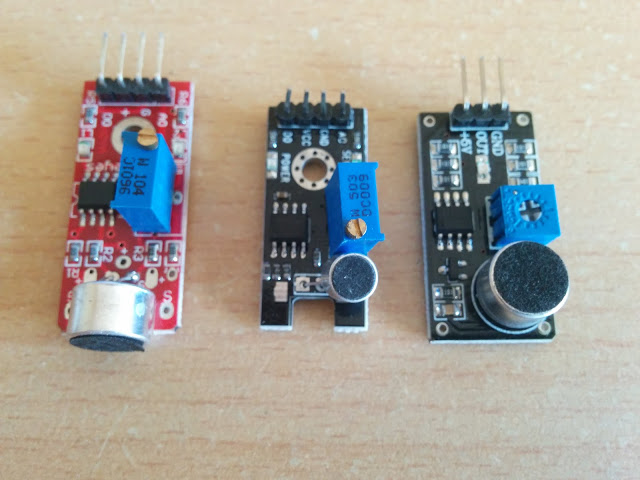Sound Sensor
-
HEllo,
I've based myself on a cookbook recipie, but it appears two issue:
-
each analogread brings 1023
-
the runningAverage keeps on increasing, never decreasing
My sensor has only analog output (see sensor
Here is the sketch:
Has anyne an idea of the analog value always the same first and then from the formulae above ?
-
-
HEllo,
I've based myself on a cookbook recipie, but it appears two issue:
-
each analogread brings 1023
-
the runningAverage keeps on increasing, never decreasing
My sensor has only analog output (see sensor
Here is the sketch:
Has anyne an idea of the analog value always the same first and then from the formulae above ?
you are maxing out the voltage on the analog pin.
did you turn the potentiometer all the way down and check the input?
try to debug the sensor with a basic sketch first, turning the pot while you look at the serial monitor. You may have to add a resistor... Then once you have it working, try your MySensors sketch.
int inputPin = 3; //check this void setup() { Serial.begin(9600); pinMode(inputPin, INPUT); } void loop() { Serial.print(analogRead(inputPin)); } -
-
Hello,
In fact it is a digital on-off output, playing with the potentimeter I saw that... so useless for my project...
-
Hello,
In fact it is a digital on-off output, playing with the potentimeter I saw that... so useless for my project...
-
digital... sadly...
-
We can still make it work, tripping when you have a loud noise
-
yes the only way, as a door contact... nut not to measure noise pollution...
-
Not sure what happened to the links in the mysensor store but here is the link to the sound sensor you need, make sure it is the one that has 4 pins, with analog output as an option.
-
Not sure what happened to the links in the mysensor store but here is the link to the sound sensor you need, make sure it is the one that has 4 pins, with analog output as an option.
@wmylionel yes I know this is my fault, I tried to order from one vendor rather to have several parcel, and lacking experience I did not check about this... nor about the wrong China Exports logo... experience come to a price...
-
@wmylionel yes I know this is my fault, I tried to order from one vendor rather to have several parcel, and lacking experience I did not check about this... nor about the wrong China Exports logo... experience come to a price...
-
-
@epierre Hard to say without a schematic... Seems to be something like this: http://yourduino.com/sunshop/images/products/SoundSensorDiagYW-700.jpg
You can try to connect to the analog input of the comparator (pin 3 of LM393) and see if it brings anything, but only if your module is similar ofcourse...
-
@epierre Hard to say without a schematic... Seems to be something like this: http://yourduino.com/sunshop/images/products/SoundSensorDiagYW-700.jpg
You can try to connect to the analog input of the comparator (pin 3 of LM393) and see if it brings anything, but only if your module is similar ofcourse...
@Yveaux Hello I'm trying to compile a sketch using TIMSK, but to use it on an atm 128, I would need either timex8 or timex128 which only comes through an avrlib.
This is where I am lost, I have an avrlib on my disk, should I replace it with the full one ? how can I manage that ?
thanks,
-
@Yveaux Hello I'm trying to compile a sketch using TIMSK, but to use it on an atm 128, I would need either timex8 or timex128 which only comes through an avrlib.
This is where I am lost, I have an avrlib on my disk, should I replace it with the full one ? how can I manage that ?
thanks,
-
@epierre I have very little time, but sharing the sketch might help to make your problem clear...
-
@epierre Had a quick look at the code. Seems the TIMSK stuff is just for timing the ADC samples at regular interval; the TIMER1_OVF_vect sets a flag (audioget_takesample) which is scanned for in the audioget_getsamples() function.
Exactly the same behavior you can get by waiting using delay() or delayMicroseconds(), and then get the sample.
That's probably easier then getting the raw timer stuff going. -
Since @hek is interrested, I'm revivind this post with several microphone available out there, in fact impossible to know if these use real electet ones...

@BulldogLowell I've seen you've participated here http://forum.arduino.cc/index.php?topic=208520.15 but do you think this was the good solution ? if you go through http://davidegironi.blogspot.fr/2014/02/a-simple-sound-pressure-level-meter-spl.html the questions is open...
-
Hmm.. not super easy to calculate an actual sound "pollution" value or do dB calculations using this I guess.
Hmm.. Adafruit using a sample window in their example.
https://learn.adafruit.com/adafruit-microphone-amplifier-breakout/measuring-sound-levels
-
Since @hek is interrested, I'm revivind this post with several microphone available out there, in fact impossible to know if these use real electet ones...

@BulldogLowell I've seen you've participated here http://forum.arduino.cc/index.php?topic=208520.15 but do you think this was the good solution ? if you go through http://davidegironi.blogspot.fr/2014/02/a-simple-sound-pressure-level-meter-spl.html the questions is open...
@epierre I have ordered almost any kind of sound sensor on aliexpress for my washing machine sensor (at first I thought to get the beeps). They were all really bad.... I went the vibration way, but if I had to start all over again I think I would get https://www.sparkfun.com/products/9964
